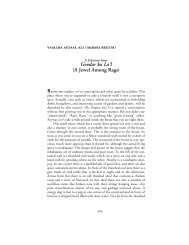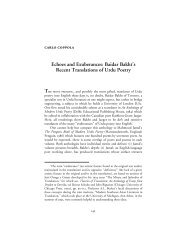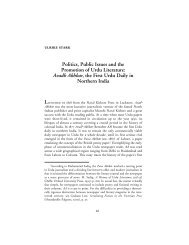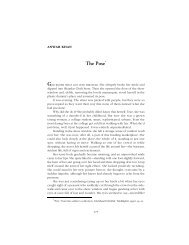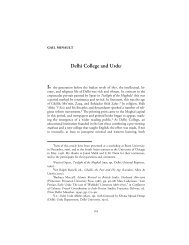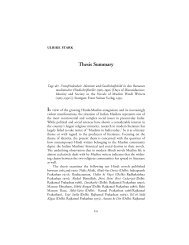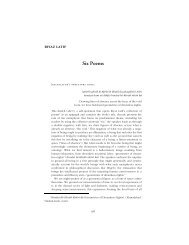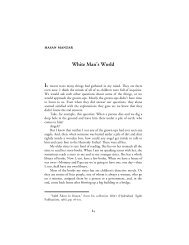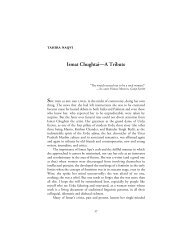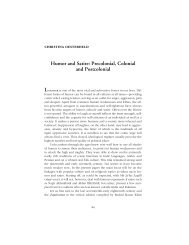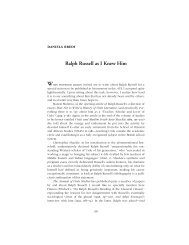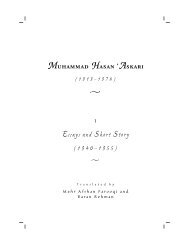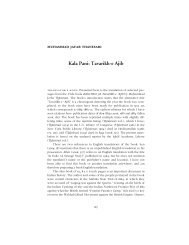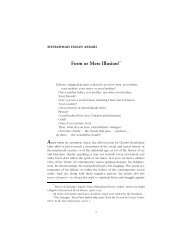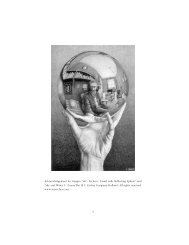Premchand's âShatranj ke Khilariâ in Translation - the Annual of Urdu ...
Premchand's âShatranj ke Khilariâ in Translation - the Annual of Urdu ...
Premchand's âShatranj ke Khilariâ in Translation - the Annual of Urdu ...
Create successful ePaper yourself
Turn your PDF publications into a flip-book with our unique Google optimized e-Paper software.
210 • The <strong>Annual</strong> <strong>of</strong> <strong>Urdu</strong> Studies, No. 28<br />
ations which cater to an English readership but erase cultural signification.<br />
In <strong>the</strong> pre-penultimate paragraph, ìvazīrî (m<strong>in</strong>ister) is translated as ìqueenî<br />
(ibid., 192) s<strong>in</strong>ce <strong>in</strong> <strong>the</strong> Western game <strong>of</strong> chess <strong>the</strong> queen and not <strong>the</strong> vazīr<br />
is empowered next only to <strong>the</strong> k<strong>in</strong>g.<br />
A bil<strong>in</strong>gual reader is li<strong>ke</strong>ly to experience notable l<strong>in</strong>guistic and cultural<br />
losses <strong>in</strong> Rub<strong>in</strong>ís translation. The untranslatability <strong>of</strong> Premchandís gynocentric,<br />
typically regional, and culturally loaded ìnigodiî (2011, 106), results<br />
<strong>in</strong> <strong>the</strong> ra<strong>the</strong>r unadorned ìwretchedî (1988, 184). Premchandís idiomatic<br />
expressions, operat<strong>in</strong>g by means <strong>of</strong> images and metaphors, and so <strong>in</strong>tricately<br />
woven <strong>in</strong>to his conversational style, are handled variously by Rub<strong>in</strong>.<br />
Most <strong>of</strong>ten, his <strong>in</strong>ability to convey <strong>the</strong> sense <strong>of</strong> <strong>the</strong> source language text<br />
by reta<strong>in</strong><strong>in</strong>g <strong>the</strong> vehicles <strong>of</strong> expression, simplifies <strong>the</strong> lexis. Rub<strong>in</strong> replaces<br />
<strong>the</strong> ìdramatic script formatî employed by Premchand for <strong>the</strong> occasional<br />
ìhe said, she as<strong>ke</strong>dî <strong>in</strong> order to <strong>ke</strong>ep <strong>the</strong> order clear (1988, 12). For <strong>the</strong><br />
most part, Rub<strong>in</strong>ís translation reta<strong>in</strong>s <strong>the</strong> sense and <strong>the</strong> flavor <strong>of</strong> <strong>the</strong> orig<strong>in</strong>al<br />
text to <strong>the</strong> extent that <strong>the</strong> cultural and l<strong>in</strong>guistic disparity <strong>in</strong>volved <strong>in</strong><br />
cross-cultural translations permits. His cross-cultural translation/transcreation<br />
acqua<strong>in</strong>ts an Anglophone readership with <strong>the</strong> authorís tale <strong>the</strong>reby<br />
provid<strong>in</strong>g a manifold <strong>in</strong>crease <strong>in</strong> readership. Although <strong>the</strong> translation is<br />
less nuanced and its rhetoric less picturesque than Premchandís, Rub<strong>in</strong>ís<br />
language accords <strong>the</strong> tale <strong>the</strong> seriousness required by <strong>the</strong> message conta<strong>in</strong>ed<br />
<strong>the</strong>re<strong>in</strong>.<br />
Conclusion<br />
Lucknow, <strong>the</strong> capital city <strong>of</strong> erstwhile Awadh, was also its cultural capital,<br />
symboliz<strong>in</strong>g grace and perfection <strong>in</strong> all aspects <strong>of</strong> life. It became renowned<br />
as <strong>the</strong> unparalleled center <strong>of</strong> cultural elegance and l<strong>in</strong>guistic ref<strong>in</strong>ement.<br />
Ironically, however, <strong>in</strong>herent to <strong>the</strong> patterns signify<strong>in</strong>g its cultural zenith<br />
were prototypically those that also contributed to its decl<strong>in</strong>e. Later, under<br />
colonial monopoly, <strong>the</strong> city and its edify<strong>in</strong>g lifestyle suffered irrevocable<br />
setbacks and alteration and <strong>the</strong> <strong>in</strong>habitants struggled <strong>in</strong> va<strong>in</strong> to hold <strong>the</strong>ir<br />
ground <strong>in</strong> ma<strong>in</strong>ta<strong>in</strong><strong>in</strong>g, if not advanc<strong>in</strong>g, cultural grace and magnificence.<br />
Although essentially urban, Premchandís story provides only a jaundiced<br />
vision <strong>of</strong> <strong>the</strong> lifestyles <strong>of</strong> <strong>the</strong> cityís élite. His authorial <strong>in</strong>terventions,<br />
<strong>in</strong> <strong>the</strong> form <strong>of</strong> <strong>the</strong> narratorís criticism <strong>of</strong> <strong>the</strong> decadent, social fabric <strong>of</strong> <strong>the</strong><br />
city, seem to ignore <strong>the</strong> flourish<strong>in</strong>g trade and commerce <strong>in</strong> <strong>the</strong> bourgeoisie<br />
power-center, which p<strong>in</strong>nacled <strong>in</strong> creative and <strong>in</strong>genious productivity and<br />
was representative <strong>of</strong> both its capitalist and its feudal culture. He also<br />
ignores its monumental grandeur, which has earned Lucknow laudable



